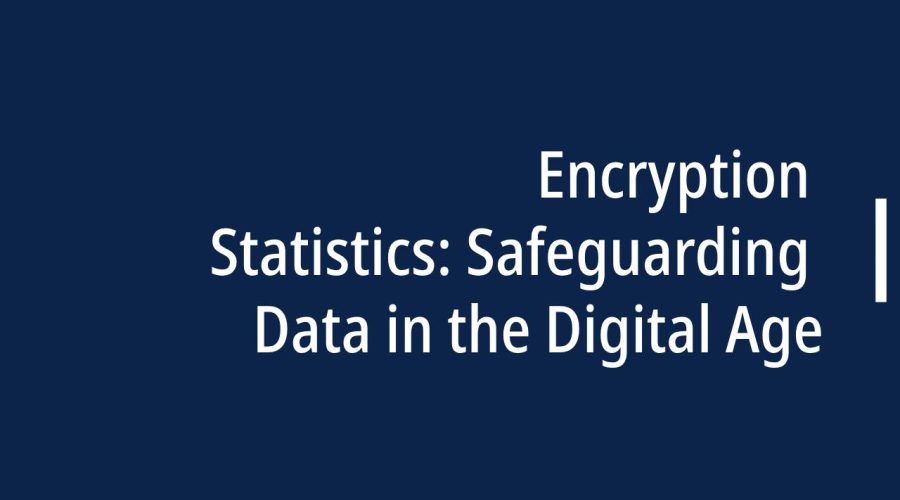Encryption is a critical technology that ensures data remains confidential and secure. In this comprehensive blog, we’ll delve into encryption statistics to provide insights into the state of data protection, the role of encryption, and the ever-evolving landscape of cybersecurity.
The Significance of Encryption
- Global Data Growth: As of 2021, the global data sphere was estimated to reach 175 zettabytes by 2025, emphasizing the need for data security.
- Cyber Threats: Cyberattacks and data breaches have surged, with cybercriminals continuously seeking unauthorized access to sensitive information.
- Privacy Concerns: Growing privacy concerns and regulations, such as GDPR and CCPA, underscore the need for robust data protection.
Encryption Adoption and Trends
- Encryption Prevalence: As of 2021, 47% of organizations worldwide were using encryption extensively, while 38% were selectively using it for specific data sets or applications.
- Endpoint Encryption: Endpoint encryption, which secures data on devices like laptops and smartphones, is widely adopted, with 74% of organizations using it.
- Cloud Encryption: 58% of organizations have adopted cloud encryption to protect data stored in cloud services like AWS, Azure, and Google Cloud.
- Email Encryption: 45% of organizations use email encryption to protect sensitive email communications.
Industry-Specific Encryption
- Healthcare Encryption: Healthcare organizations have high encryption adoption due to strict data protection regulations. As of 2021, 72% of healthcare organizations had extensive encryption.
- Financial Sector: The financial sector follows closely, with 63% of organizations using extensive encryption to secure financial data.
- Government and Public Sector: Government and public sector entities are also adopting encryption extensively, with 55% using this technology.
Encryption in IoT and Mobile
- IoT Encryption: As the Internet of Things (IoT) grows, the importance of encryption in securing IoT devices and data increases. In 2021, 60% of organizations had adopted IoT encryption.
- Mobile Device Encryption: Mobile device encryption is essential in the era of remote work. 66% of organizations used mobile device encryption in 2021.
Impact of Remote Work
- Remote Work Surge: The COVID-19 pandemic accelerated the adoption of remote work, increasing the need for encryption to secure data accessed outside traditional office networks.
- VPN Usage: The use of Virtual Private Networks (VPNs) and encrypted connections surged as remote work expanded.
The Role of Encryption in Compliance
- GDPR Compliance: The General Data Protection Regulation (GDPR) in Europe mandates data encryption as a measure to protect personal data. Non-compliance can result in hefty fines.
- HIPAA Compliance: The Health Insurance Portability and Accountability Act (HIPAA) in the U.S. requires encryption to protect patients’ health information.
- CCPA Compliance: The California Consumer Privacy Act (CCPA) emphasizes the need for encryption to safeguard consumer data.
Encryption Methods and Standards
- AES Encryption: Advanced Encryption Standard (AES) is widely used and recommended by governments and security experts. It’s considered highly secure.
- End-to-End Encryption: End-to-end encryption is essential for secure messaging apps like WhatsApp and Signal, ensuring only the sender and recipient can read the content.
- Public Key Infrastructure (PKI): PKI is crucial for secure communications and authentication, using public and private keys.
Encryption and Cloud Services
- Cloud Storage Encryption: Cloud service providers like AWS, Azure, and Google Cloud offer encryption options to secure data at rest and in transit.
- Bring Your Own Key (BYOK): BYOK services allow users to manage and control their encryption keys in the cloud, offering additional security.
Evolving Encryption Technologies
- Quantum-Safe Encryption: The rise of quantum computing necessitates the development of quantum-resistant encryption methods to protect data from future threats.
- Homomorphic Encryption: Homomorphic encryption enables computation on encrypted data without decryption, preserving privacy.
Encryption for Secure Communication
- Email Encryption: Email encryption tools like PGP and S/MIME secure email communications, protecting messages from interception.
- Secure Chat and Messaging Apps: Secure messaging apps like Signal and Telegram use encryption to protect conversations from eavesdropping.
- Video Conferencing Encryption: With the growth of video conferencing, end-to-end encryption ensures secure virtual meetings.
Mobile Device Encryption
- Full Disk Encryption: Full disk encryption secures data on mobile devices, making it unreadable without the appropriate key.
- Mobile App Encryption: Encryption is used to protect data within mobile applications, preventing unauthorized access.
The Cost of Data Breaches
- Data Breach Costs: Data breaches can be financially devastating. The global average cost of a data breach was $4.24 million in 2021.
- Ransomware Impact: Ransomware attacks have surged, with an average ransom demand of $178,254 in 2021.
Encryption Challenges
- Key Management: Proper key management is essential for encryption. Organizations must safeguard encryption keys to prevent unauthorized access.
- Usability vs. Security: Striking a balance between user-friendly encryption and robust security is a challenge.
- Compliance Complexity: Meeting data protection regulations requires a deep understanding of encryption standards and compliance requirements.
Data Breach Consequences
- Reputation Damage: Data breaches harm an organization’s reputation, impacting customer trust and loyalty.
- Stock Price Decline: Share prices can drop significantly following a data breach announcement, affecting market capitalization.
The Future of Encryption
- Post-Quantum Cryptography: Research into post-quantum cryptography aims to develop encryption methods resistant to quantum computing threats.
- Enhanced Privacy: Encryption will continue to play a pivotal role in safeguarding individual privacy in the digital age.
- IoT Security: As IoT grows, encryption will be integral in securing the vast array of interconnected devices.
Conclusion
In a world where data is king, encryption is the knight in shining armor that guards it against the lurking threats of cyberattacks and data breaches. With the adoption of encryption on the rise across various industries and the continuous development of new encryption technologies, the future looks promising for data security. As organizations and individuals navigate the complexities of data protection and compliance, encryption remains a foundational pillar in the ongoing battle for digital privacy and security.

Gloria Bradford is a renowned expert in the field of encryption, widely recognized for her pioneering work in safeguarding digital information and communication. With a career spanning over two decades, she has played a pivotal role in shaping the landscape of cybersecurity and data protection.
Throughout her illustrious career, Gloria has occupied key roles in both private industry and government agencies. Her expertise has been instrumental in developing state-of-the-art encryption and code signing technologies that have fortified digital fortresses against the relentless tide of cyber threats.
